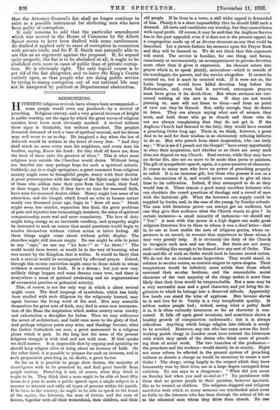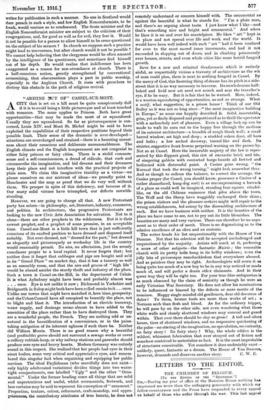SERMONIZING.
II1THERTO religious revivals have always been accompanied— some people would even say produced—by a revival of preaching. Religious oratory, and a very general increase of delight in public worship, are the signs by which the great waves of religious emotion have been most obviously marked. A revival without these signs is thinkable, but without precedent. The prophet Jeremiah dreamed of such a time of spiritual renewal, and his dream may well recur to us to-day. He imagined a day when the law of Jehovah would be written in the heart of every Jew. "And they shall teach no more every man his neighbour, and every man his brother, saying, Know the Lord : for they shall all know me, from the least of them unto the greatest of them." This is what most religious men outside the Churches would desire. Without being too fanciful one may perhaps hope for such a spiritual miracle. Suddenly, say in a single springtime, a great easement from religious anxiety might come to thoughtful people, weary with their doubts A great preoccupation with the things of the Spirit might take hold of those who seldom raise their eyes from their work, their food, or their wages, but who, if they have no time for reasoned faith, have none for reasoned doubts either. Money might lose some of its attraction, and the Gospel, which found an echo in human nature nearly two thousand years ago, begin to "draw all men." Death might seem less sinister, separation less final, the great problems of pain and injustice less tormentingly insistent, the sense of spiritual companionship more real and more consolatory. The love of duty might bring energy as an inevitable corollary, and sympathy might be increased to such an extent that social questions would begin to resolve themselves without violent action or bitter feeling. All these things might come about without public display. The churches might still remain empty. No one might be able to point to any "sign," no one say "Lo here ! " or "Lo there ! " The world would have learnt, or would be in the way of learning, what was meant by the Kingdom that is within. It would be likely that such a revival would be accompanied by effectual prayer. Indeed, through this means conviction might come to those minds to whom evidence is essential to faith. It is a dream ; but just now very unlikely things happen and some dreams come true, and there is everywhere a sense of spiritual awakening and no augmentations of ceremonial practice or polemical activity.
This, of course, is not the only way in which a silent revival might come. The dead language of symbolism, which has lately been studied with such diligence by the religiously learned, may again become the living word of the souL Men may assemble themselves for great acts of faith, may find in some new interpreta- tion of the Mass the inspiration which makes oratory seem tawdry and exhortation a discipline for babes. Then we may rediscover the secret of architecture, and build once more to the glory of God. And perhaps religious poets may arise, and theology become, what the Gothic Cathedrals are now, a great monument to a religious phase which is past. In the long last the issue of the present religious struggle is with God and not with man. If God speaks we shall answer. It is impossible that by arguing and agonizing we should keep religion alive or bring about an increase of faith. On the other band, it is possible to prepare for such an increase, and in such preparation preaching is, no doubt, a great factor.
So far as it is possible to gauge their desires, the majority of churchgoers wish to be preached to, and find great benefit from pulpit oratory. Preael.ing is not, of course, what they think it ought to he. They think that a man ought to be able at least fifty times in a year to make a public speech upon a single subject in a manner to interest and edify all types of persons within his parish. If he lives in the country, he ought to be able to speak to the heart of the squire, the labourer, the man of letters, and the man of leisure, together with all their womenkind, their children, and their old people. If he lives in a town, a still wider appeal is demanded of him. Plainly it is a sheer impossibility that he should fulfil such a demand. All sorts and conditions can worship, but they cannot listen with equal profit. Of course, it may be said that the Anglican Service has in the past appealed, even if it does not in the present appeal, te a congregation made up of as diverse elements as any that could be described. Let a parson fashion his sermons upon the Prayer Book and they will be listened to. We do not think that this argument will stand. The service is familiar, for one thing, and forms, consciously or unconsciously, an accompaniment to private devotion more often than it gives it expression. An element enters into prayer which is, to speak plainly, miraculous—which is outside of the worshipper, the parson, and the service altogether. It cannot be counted on, but it must be counted with. If it were not so, the Latin language would have killed devotion long before the Reformation, and, even had it survived, extempore prayers must have given it its death-blow. But where sermons are con- cerned nothing of the sort is true. If they are not worth listening to, men will not listen to them—and from no point of view can they be blamed. But, oddly enough, they do desire to listen. They are always saying what sort of sermon they want, and both those who go to church and those who do not are always complaining that they do not get it. If the Anglican Church had listened to the laity, they would have created a preaching Order long ago. There is, we think, however, a great deal to be said for their wisdom in so obstinately refusing hitherto to do so. Men who preach from sheer inspiration, who can truly say : "Woe is me if I preach not the Gospel 1" have every opportunity to obey their inspiration, and whether or no there are many such does not depend on any Church. Real orators, while they may have no divine fire, also are no more to be made than poets or painters. The gift of sympathetic speech, again, is a pure question of character. It comes to many men who have no power of preaching properly so called. It is an immense gift, but those who possess it are, as a rule, unconscious of it, and would never consent to give all their time to its cultivation. Indeed, if they attempted to do so they would lose it. There remain a good many excellent lecturers who can elucidate the vexed questions of theology and a crowd of men with the histrionic gift. What the lecturers can supply could be supplied by books, and, in the case of the young, by Sunday-schools. The men with histrionic power can always get an audience, but can they give that audience what the Church wants to give ? In certain instances—a small minority of instances—we should say "Yes." A man with this power in a high degree can make great religious literature live to those to whom it was a dead letter—that is, he can at least enable the men of religious genius, whose ex- perience is on record, to recount that experience to those whom it may very greatly help. It is obviously the duty of the Church to recognize such men and use them. But there are not many such—nothing like enough to be formed into any sort of Order. The rank-and-file of such an Order would tend to become sacred actors. We do not for an instant mean hypocrites. They would stand, in relation to secular actors, as oratorio singers to opera singers. Their temptations would be infinitely more subtle than those which surround their secular brethren, and the unassailable moral character of the vast majority of the clergy makes it more than likely that their lives would be irreproachable. But a man may be a very successful man and a good character, and yet bring the in- stitution to which he belongs into a deserved ridicule. Apparently few heads can stand the wine of applause. Men become slaves to it and live for it. Vanity is a very inexplicable quality. It seldom makes people bad ; indeed, seeing what a paltry fault it is, it is often curiously innocuous so far as character is con- cerned. It falls off upon great occasions, and sometimes shows a healthy growth of compunction underneath ; but it is always ridiculous. Anything which brings religion into ridicule is surely to be avoided. Moreover, any one who has come across the hard- working parish clergy in London must have noticed the bitterness with which they speak of the clerics who think more of preach- ing than of social work. The two branches of the profession— the preachers and the workers—would shortly be at enmity. Might not some reform be effected in the present system of preaching without so drastic a change as would be necessary to create a new Order ? The clergy, owing largely to the respect which they have honourably won by their lives, are in a large degree exempted from criticism. No one says to a clergyman : "What did you mean on Sunday last when you said so-and-so ? " No parishioner tells them that no grown people in their parishes, however ignorant, like to be treated as children. The religious doggerel and religious anecdotes with which so many sermons are interlarded mirst seem as futile to the labourer who has been through the school of life as to the educated man whom they drive from church. No one writes for publication in such a manner. No one in Scotland would dare preach in such a style, and few English Nonconformists, to be frank, would venture so to condescend. The Scots minister and the English Nonconformist minister are subject to the criticism of their congregations, and, for good as well as for evil, they fear it. Would it not be possible for a parson to allow himself to be cross-questioned on the subject of his sermon ? In church we suppose such a practice might lead to irreverence, but after church would it not be possible ? We cannot help believing that the clergyman would be often amazed by the intelligence of his questioners, and sometimes find himself out of his depth. He would realize that indifference has been exaggerated as a reason for non-attendance at church. There is a half-conscious notion, greatly strengthened by conventional sermonizing, that obscurantism plays a part in public worship, especially in the Anglican Church. It rests with preachers to destroy this obstacle in the path of religious revival.



































 Previous page
Previous page